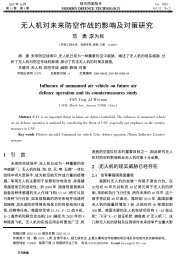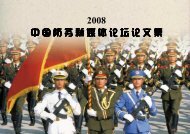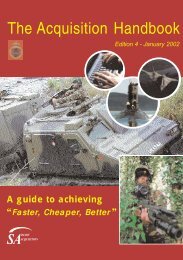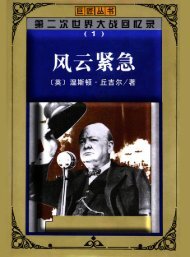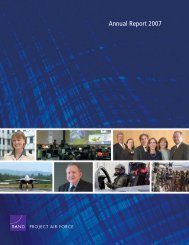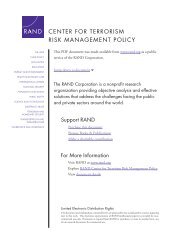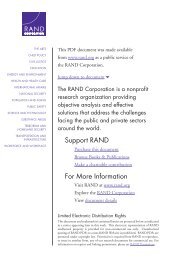How Terrorist Groups End - RAND Corporation
How Terrorist Groups End - RAND Corporation
How Terrorist Groups End - RAND Corporation
Create successful ePaper yourself
Turn your PDF publications into a flip-book with our unique Google optimized e-Paper software.
The Limits of America’s al Qa’ida Strategy 109<br />
the military is so evil that the terrorists’ radical goals are justified. 21 Al<br />
Qa’ida figures, including Ayman al-Zawahiri, adopted the strategy in<br />
such countries as Egypt “to force the Egyptian regime to become even<br />
more repressive, to make the people hate it.” 22<br />
The use of military force in Iraq was a specific problem. The United<br />
States diverted precious resources and scarce attention to overthrowing<br />
Saddam Hussein’s government and away from the war against al<br />
Qa’ida in most of the world. Gary Schroen, who led the first CIA team<br />
into Afghanistan in 2001, argued that the war in Iraq drained Afghanistan<br />
of key U.S. military personnel. Iraq also drained key CIA personnel<br />
and resources from Afghanistan, “making it increasingly difficult<br />
to staff the CIA teams in Afghanistan with experienced paramilitary<br />
officers.” 23 Indeed, the United States did not have a sufficient number<br />
of personnel to target key al Qa’ida leaders in Pakistan and other countries,<br />
because they were diverted to Iraq. The capture of many key al<br />
Qa’ida leaders, such as Khalid Sheikh Mohammed, Ramzi Binalshibh,<br />
and Abu Zubeida, occurred between 2001 and 2003. After the overthrow<br />
of Saddam’s government, this attention shifted to stabilizing an<br />
increasingly violent war in Iraq. In sum, the United States lacked the<br />
resources and attention to adequately defeat al Qa’ida, because it was<br />
diverted to Iraq.<br />
Iraq was also helpful to al Qa’ida, since it established a foothold<br />
that it did not previously have. On the occasion of the second and<br />
third anniversaries of the September 11 attacks, the group’s second-incommand,<br />
Ayman al-Zawahiri provided the clearest explanation of al<br />
Qa’ida’s strategy in Iraq: He declared in September 2003,<br />
We thank God for appeasing us with the dilemmas in Iraq and<br />
Afghanistan. The Americans are facing a delicate situation in<br />
21 Kydd and Walter (2006, pp. 69–72); David Fromkin, “The Strategy of Terrorism,” Foreign<br />
Affairs, Vol. 53, No. 4, July 1975, pp. 683–698.<br />
22 Lawrence Wright, The Looming Tower: Al-Qaeda and the Road to 9/11, New York: Knopf,<br />
2006, p. 217.<br />
23 Gary C. Schroen, First In: An Insider’s Account of <strong>How</strong> the CIA Spearheaded the War on<br />
Terror in Afghanistan, New York: Presidio Press/Ballantine Books, 2005, p. 360.




